How to stop cats from pooping in my yard – Are you tired of finding unwanted surprises in your yard? If cats have made your outdoor space their personal toilet, it’s time to take action. This comprehensive guide will empower you with proven strategies to keep your yard cat-poop-free, ensuring a pristine and enjoyable outdoor oasis.
Behavioral Causes and Solutions
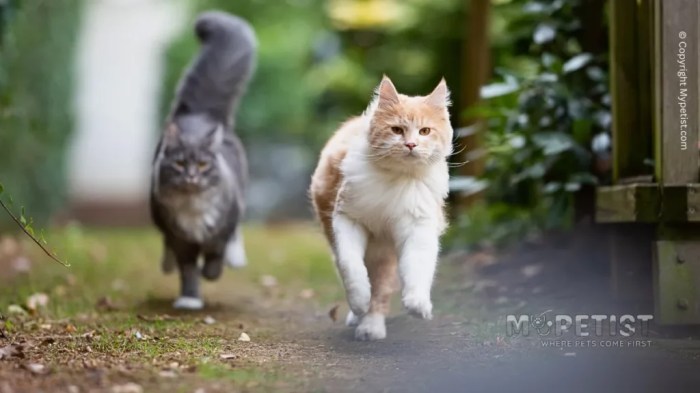
Cats are often attracted to yards for various reasons, including territorial marking, fear, or stress. Understanding the underlying cause of their behavior is crucial for developing effective solutions.
One of the most frustrating things for any homeowner is dealing with cats pooping in their yard. Not only is it unsightly, but it can also be a health hazard. If you’re looking for a way to keep cats out of your yard, one of the best things you can do is to create a vertical herb garden.
Cats hate the smell of certain herbs, such as lavender, rosemary, and mint. By planting these herbs around the perimeter of your yard, you can create a natural barrier that will deter cats from entering. Vertical herb gardens are also a great way to add beauty and fragrance to your yard.
So, not only will you be keeping cats out of your yard, but you’ll also be creating a beautiful and inviting space for yourself and your family.
To address territorial marking, remove any potential attractants such as food or litter boxes from your yard. Additionally, providing your cat with a designated safe space indoors can help reduce their anxiety and the need to mark territory.
Addressing Fear and Stress, How to stop cats from pooping in my yard
If your cat is pooping in your yard due to fear or stress, identifying and addressing the source of their anxiety is essential. This may involve creating a calm and secure environment indoors, providing hiding places, or consulting with a veterinarian about possible underlying medical conditions.
Physical Deterrents
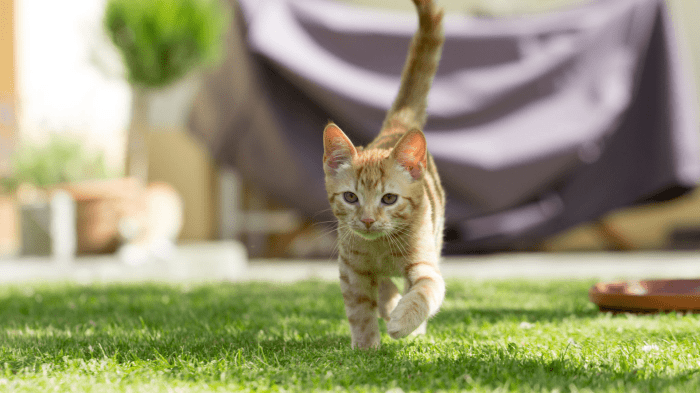
Cats are notorious for their ability to find ways into even the most secure yards. However, there are a number of physical deterrents that can be used to keep them out.
One of the most effective physical deterrents is a fence. A fence should be at least 6 feet high and made of a sturdy material such as wood, metal, or chain link. It should also be buried at least 12 inches underground to prevent cats from digging under it.
Another effective physical deterrent is a motion-activated sprinkler. These sprinklers are designed to spray water when they detect movement, which can startle cats and keep them away from your yard.
Types of Physical Deterrents
- Fences: Fences can be made of wood, metal, or chain link and should be at least 6 feet high and buried 12 inches underground.
- Motion-activated sprinklers: These sprinklers spray water when they detect movement, which can startle cats and keep them away from your yard.
- Cat repellents: Cat repellents are available in a variety of forms, including sprays, granules, and ultrasonic devices. They work by creating an unpleasant smell or sound that cats find aversive.
- Citrus peels: Cats dislike the smell of citrus fruits, so spreading orange or lemon peels around your yard can help to deter them.
- Coffee grounds: Coffee grounds are another natural cat repellent. Sprinkle them around your yard to keep cats away.
Natural Repellents

Cats have a strong sense of smell, and certain scents can be unpleasant to them. Using natural repellents is a humane and effective way to deter cats from pooping in your yard.
Citrus Peels
- Citrus fruits, such as oranges, lemons, and grapefruits, contain limonene, a compound that cats find repulsive.
- Peel the citrus fruits and scatter the peels around the areas where cats tend to poop.
- Refresh the peels every few days to maintain their effectiveness.
Coffee Grounds
- Coffee grounds have a strong, bitter odor that cats dislike.
- Sprinkle coffee grounds around the perimeter of your yard or in areas where cats have been pooping.
- You can also place coffee grounds in a mesh bag and hang it in your yard.
Commercial Products: How To Stop Cats From Pooping In My Yard
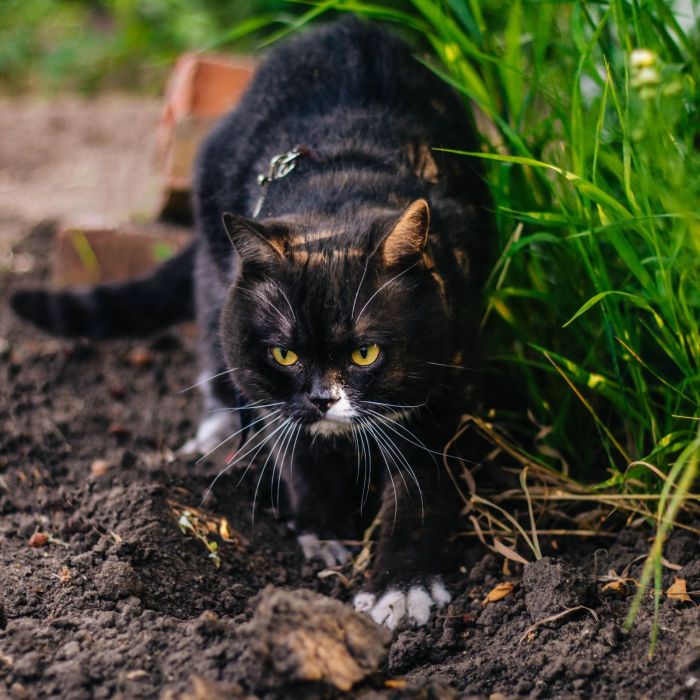
Commercial products are readily available to deter cats from pooping in yards. These products come in various forms, including sprays, granules, and ultrasonic devices, and contain active ingredients that are specifically designed to repel cats.
When choosing a commercial product, it’s important to consider the active ingredients and their potential effects on cats and the environment. Some common active ingredients include:
Sprays
- Citrus oils:Cats dislike the strong scent of citrus fruits, so sprays containing citrus oils can be effective deterrents.
- Peppermint oil:Peppermint oil is another natural repellent that cats find unpleasant.
- Capsaicin:Capsaicin, the active ingredient in chili peppers, creates a burning sensation that cats find irritating.
Granules
- Ammonium chloride:Ammonium chloride is a chemical that produces a strong ammonia smell, which cats find offensive.
- Naphthalene:Naphthalene is a chemical that is used in mothballs and has a strong odor that cats dislike.
- Sulfur:Sulfur is a natural element that can be used as a cat repellent.
Ultrasonic Devices
- Ultrasonic devices:Ultrasonic devices emit high-pitched sounds that are inaudible to humans but can be irritating to cats.
Home Remedies
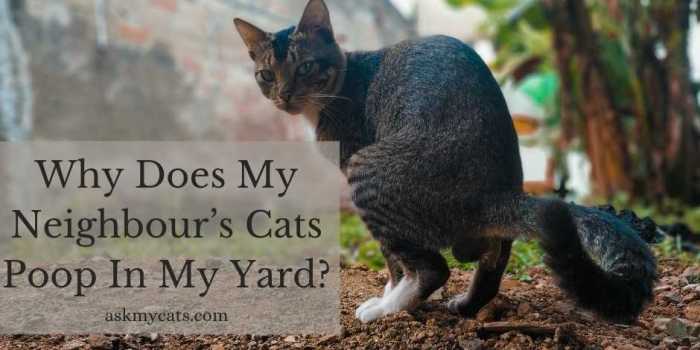
DIY solutions can be effective in repelling cats from your yard. These remedies utilize ingredients commonly found in households and are easy to make.
Below are some popular home remedies and instructions on how to use them:
Citrus Sprays
Cats dislike the smell of citrus fruits, making citrus sprays an effective deterrent. To create a citrus spray:
- Combine 1 cup of lemon or orange juice with 2 cups of water in a spray bottle.
- Shake well and spray around areas where cats tend to poop, such as flower beds and garden borders.
- Reapply the spray after rain or watering.
Vinegar Traps
Vinegar is another scent that cats find unpleasant. To create a vinegar trap:
- Place small bowls of white vinegar in areas where cats have been pooping.
- The vinegar’s strong odor will deter cats from approaching.
- Replace the vinegar regularly to maintain its effectiveness.
Coffee Grounds
Coffee grounds have a strong, bitter aroma that cats find unappealing. To use coffee grounds as a deterrent:
- Sprinkle used coffee grounds around areas where cats poop.
- The smell will keep cats away.
- Reapply the coffee grounds after rain or watering.
Training and Reinforcement
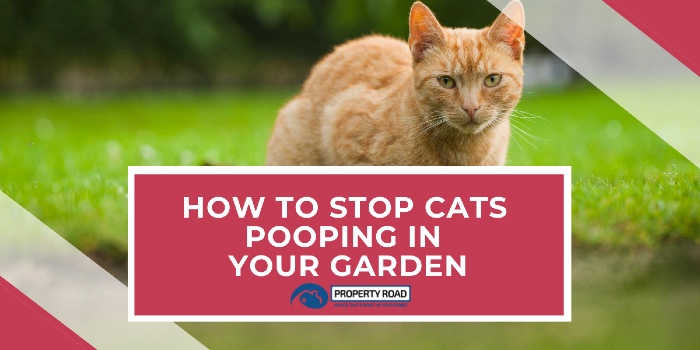
Cats are intelligent creatures that can be trained to behave in certain ways. Training techniques like positive reinforcement and clicker training can be used to discourage cats from pooping in your yard.
Positive reinforcement involves rewarding a cat with something it enjoys, such as a treat or praise, when it exhibits the desired behavior. Clicker training uses a clicker to mark the exact moment a cat performs the desired behavior, which is then followed by a reward.
As a homeowner, maintaining a pristine backyard is a top priority. However, the persistent problem of cats pooping in my yard can be a major nuisance. To combat this issue, I’ve explored various methods to deter these unwelcome visitors. By implementing motion-activated sprinklers and placing citrus peels around the perimeter, I’ve noticed a significant reduction in feline intruders.
However, for a comprehensive solution, I highly recommend checking out the backyard section of Neopro College’s website here. Their expert advice on landscaping and pet-proofing your yard will provide invaluable insights into creating a cat-free zone, allowing you to enjoy your outdoor space with peace of mind.
Implementing Training Methods
- Identify the problem areas:Determine the specific areas in your yard where cats are pooping.
- Establish a designated potty area:Create a specific spot in your yard where you want cats to poop. Make it attractive with catnip or a comfortable litter box.
- Supervise your cat:When you see your cat going near the problem areas, gently redirect it to the designated potty area.
- Reward your cat:When your cat uses the designated potty area, reward it immediately with a treat or praise.
- Be patient and consistent:Training takes time and consistency. Continue to reward your cat every time it uses the designated potty area, and eventually, it will learn to avoid pooping in other areas.
Environmental Modifications

Modifying your yard’s environment can make it less appealing to cats and discourage them from using it as a bathroom. By removing hiding spots and providing alternative litter box options, you can create a less inviting space for feline visitors.
Removing Hiding Spots
Cats prefer secluded areas to do their business, so eliminating hiding spots can make your yard less appealing. Trim overgrown bushes and shrubs, remove piles of leaves or debris, and seal any holes or crevices that cats could use as a toilet.
Providing Litter Boxes
If you have outdoor cats in your neighborhood, consider providing a designated litter box in your yard. Place it in a secluded spot that is accessible to cats but not easily visible from the house. Keep the litter box clean and regularly remove waste to encourage cats to use it instead of your yard.
One way to keep cats out of your yard is to plant trees or shrubs that they don’t like. Cats dislike the smell of certain plants, such as rue, lavender, and rosemary. Planting these trees for creating privacy can help to deter cats from entering your yard.
Cats also dislike the feeling of wet paws, so keeping your yard free of standing water can also help to keep them away.
Other Considerations
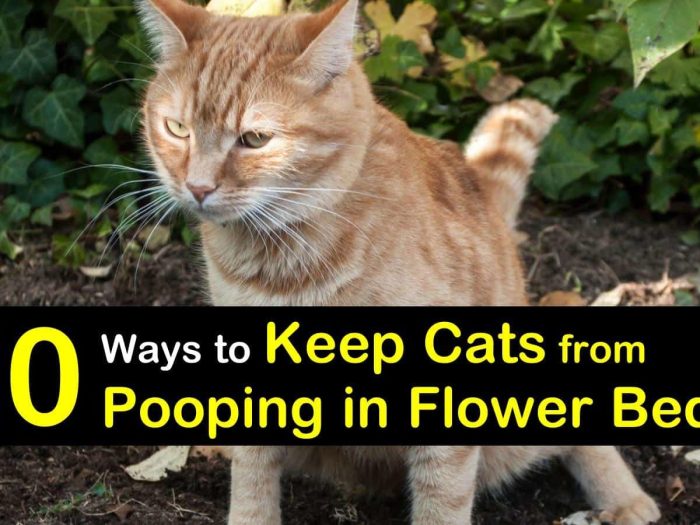
Implementing solutions to deter cats from pooping in your yard may come with certain challenges. It’s crucial to address these concerns and find effective ways to navigate them.
One potential issue is ensuring the safety of wildlife. Some repellents or deterrents may pose a risk to birds, small animals, or insects. It’s important to choose products that are specifically designed for cats and minimize potential harm to other creatures.
Neighbor Disputes
Another potential challenge is avoiding disputes with neighbors. Some solutions, such as physical barriers or noise-emitting devices, may create disturbances or affect neighboring properties. It’s advisable to communicate with your neighbors beforehand, explain your situation, and seek their understanding or cooperation.
If you encounter any difficulties or conflicts, consider reaching out to local animal control authorities or a professional animal behaviorist. They can provide guidance, support, and help resolve issues effectively.
Final Wrap-Up
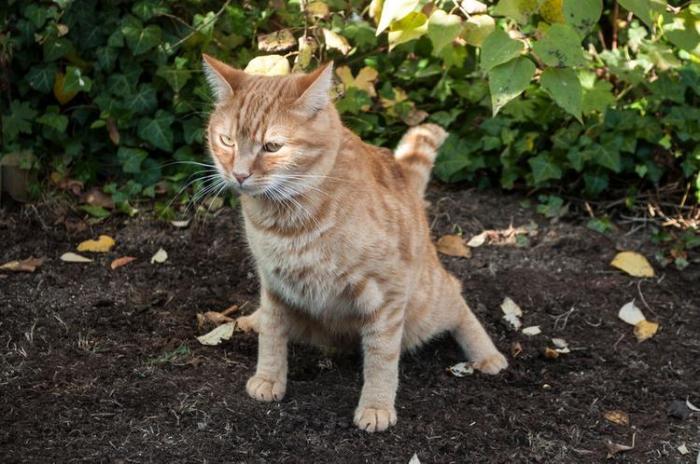
By implementing the solutions Artikeld in this guide, you can effectively deter cats from pooping in your yard. Remember, consistency and patience are key. With a little effort, you can reclaim your outdoor space and enjoy a cat-poop-free yard once again.